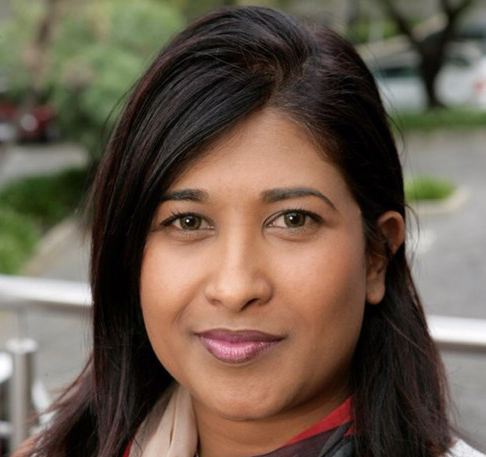Eusebius McKaiser said we need to change our culture of seeing crime as acceptable
SPONSORED
This webinar was sponsored by Business Leadership South Africa and Tax Justice South Africa. Guest speakers included Yusuf Abramjee, Founder of Tax Justice South Africa; Patricia Pillay, CEO for the Beer Association of South Africa and Eusebius McKaiser, Broadcaster, Author, Political Analyst, Debate and Public Speaking Coach and Lecturer. The panel was moderated by Gugulethu Mfuphi, Presenter at Kaya Bizz, KayaFM95.9. Busisiwe Mavuso, CEO of BLSA and Tebele Luthuli, MD of Business Against Crime South Africa and Director of Policy and Legislation at BLSA delivered their remarks via video.
More than 117 000 jobs lost in the liquor industry. More than R4-billion in tax revenue forfeited. A plummeting GDP. And one syndicate of very wealthy criminals.
 Tebele Luthuli is Managing Director of Business Against Crime South Africa and Director of Policy and Legislation at Business Leadership South Africa
Tebele Luthuli is Managing Director of Business Against Crime South Africa and Director of Policy and Legislation at Business Leadership South Africa This is the lay of the land in South Africa as it eases out of stringent lockdown, following two alcohol bans and an almost five-month long prohibition of cigarette sales. Tebele Luthuli said that the bans had led to the loss of important investment deals: Consol Glass had pulled a R1.5-billion investment from the country; South African Breweries had rethought a R2.5-billion investment and Heineken had cancelled its plans to build a R6-billion brewery in the country.
As the fiscus now expects a tax shortfall of between R12- and R15-billion at the end of the year (worsened substantially by the ban); as thousands of taverns across the country (more than half of which are owned by women) have been forced out of business thanks to lockdown, illicit traders have moved into the space and literally made a fortune selling booze and cigarettes on the black market.
 Yusuf Abramjee is the Founder of Tax Justice South Africa
Yusuf Abramjee is the Founder of Tax Justice South Africa“These syndicates, I would suspect, made in excess of R100-million every day, thanks to the ban on tobacco alone,” said Yusuf Abramjee. According to Abramjee, the implicated criminals “are running amok in our country”.
“And yet the minister of police and his men and women in blue have the audacity to go to a roadblock or stop somebody with two packets of cigarettes and arrest them,” he said.
Patricia Pillay said that during the alcohol and tobacco bans, South Africans simply switched to illegal sources in order to procure their alcohol and smokes. “The behaviour did not stop”, said Pillay. “People were still consuming, they were just paying more for the substance.” Substances that cost R200 from a legal outlet were selling for at least R500 on the black market, she said.
The result? At least 400 000 households that are reliant on income from taverns face financial hardship, while small pockets of criminals enriched themselves.
 Patricia Pillay is the Chief Executive Officer for the Beer Association of South Africa
Patricia Pillay is the Chief Executive Officer for the Beer Association of South Africa Abramjee summed up the growing mood among South Africans who are faced with the brazen reality of corruption ushered in with Covid-19. “For government to say ‘enough is enough’ on corruption is not enough,” said Abramjee.
“South Africans are sick and tired of this nonsense … we need action.”
Author and political analyst Eusebius McKaiser said that the outrage that many South Africans feel when confronted by stories of corruption is “critically important”, but that in itself will not galvanise change.
Disgruntled South Africans need to “put the rage aside”, tactically co-operate with one another regardless of their differences and “organise, organise, organise”.
He called for an overhaul of the entire criminal justice system, so that prosecutions happen swiftly and effectively. Criminals need to know that there is a good chance they will be put behind bars for their actions, which is currently not the case, he said.
Seventy percent of the webinar’s 200 attendees felt that the weakest links in dealing with corruption in South Africa were two-fold: the country’s whistleblowing processes (including the protection of whistle-blowers) and the ability of law-enforcement agencies to investigate and prosecute matters successfully.
But at the root of it all, McKaiser argued, South Africans need to address a more ethereal problem: “it’s a cultural problem,” he said.
“We need to make it fundamentally uncool, antisocial; deeply embarrassing to even be accused of a crime,” he said. “Right now in South Africa …. being accused of a crime doesn’t end your career, it doesn’t stop you being invited to a braai — and in fact, you might get promoted to the provincial legislature in KwaZulu-Natal,” he said, referring to the recent appointment of fraud-accused Zandile Gumede to that province’s leadership.
 Busisiwe Mavuso, CEO of Business Leadership South Africa
Busisiwe Mavuso, CEO of Business Leadership South Africa“We’ve got to find ways of habituating men and women to feel that it is really, really, awesome to be responsive to the needs of citizens and to be deeply committed to constitutionalism.”
As we face the current challenges in our country, South Africans should fight against becoming despondent.
The biggest friend to corruption, said McKaiser, is when citizens adopt a fatalistic attitude and accept that corruption is inevitable.
Busisiwe Mavuso highlighted the macro-economic importance of putting our collective foot down sooner rather than later. “Evidence has shown that countries that are rife in corruption don’t do very well in as far as domestic investment is concerned, as well as attracting international foreign direct investment,” she said.
 Gugulethu Mfuphi is the presenter at Kaya Bizz, KayaFM95.9
Gugulethu Mfuphi is the presenter at Kaya Bizz, KayaFM95.9McKaiser pointed out that those figures have a real, personal impact on the poorest South Africans. The human cost of corruption and illicit trade is “incredible”, he said.
“There is a basic waste of sheer human potentiality for millions of South Africans who do not have an opportunity to live their best lives as a result of corruption not being dealt with.”
Abramjee called for immediate, collaborative action to stop the scourge and in so doing, allow more South Africans to prosper. “The time is now for South Africans to stand up against criminality, to stand up against corruption, to stand up against crime, and not to support the illicit trade,” he said. — Thalia Holmes